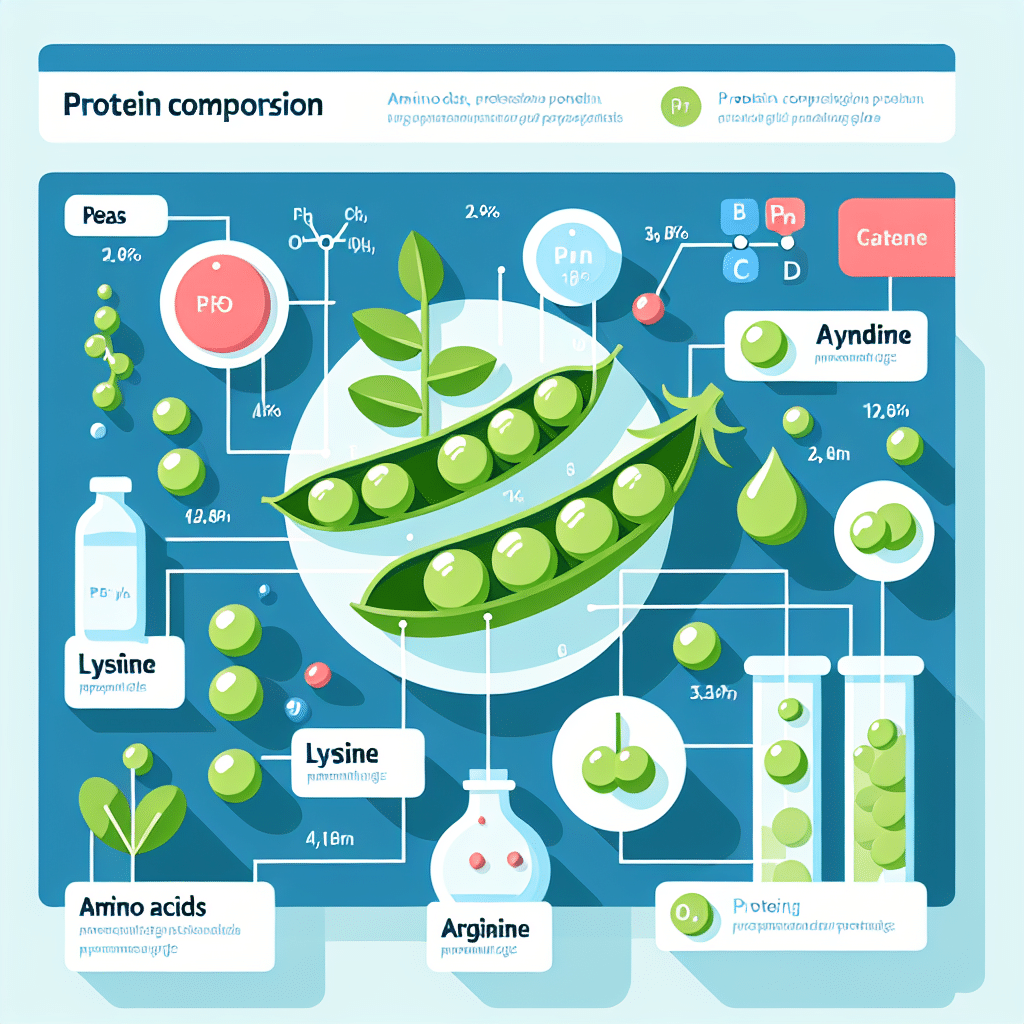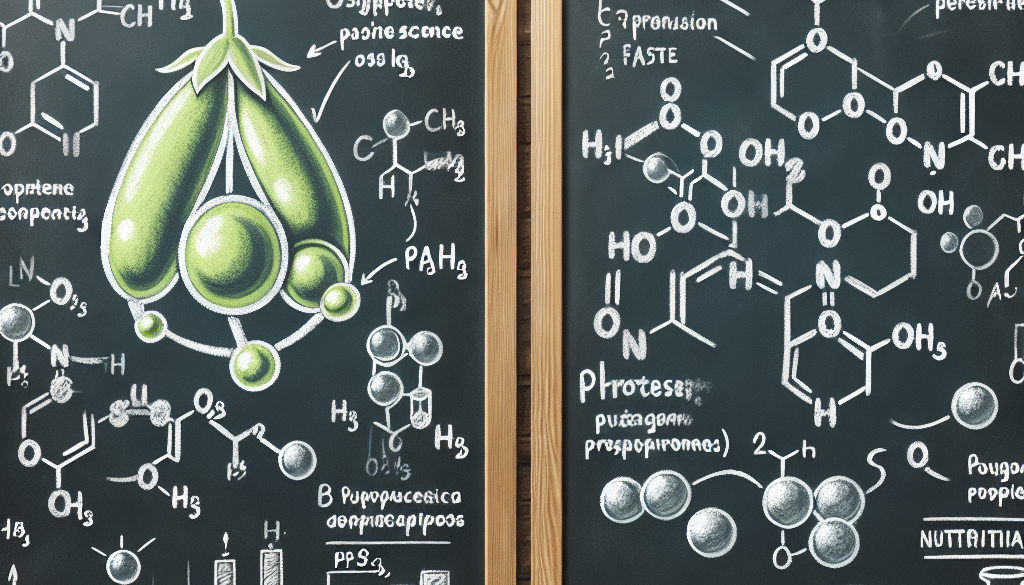Is Pea Protein High In Lysine Or Arginine?
-
Table of Contents
- Pea Protein: Analyzing Its Lysine and Arginine Content
- Understanding Amino Acids in Protein Sources
- Pea Protein’s Amino Acid Profile
- Lysine Content in Pea Protein
- Arginine Content in Pea Protein
- Comparing Pea Protein to Other Protein Sources
- Health Benefits and Considerations
- Conclusion: The Amino Acid Advantage of Pea Protein
- Discover ETprotein’s Premium Pea Protein Products
Pea Protein: Analyzing Its Lysine and Arginine Content

Pea protein has gained popularity as a plant-based alternative to animal-derived proteins. It’s a favorite among vegetarians, vegans, and those with dietary restrictions such as lactose intolerance or allergies to dairy or soy. As the demand for plant-based nutrition grows, understanding the amino acid profile of pea protein, particularly its lysine and arginine content, becomes increasingly important for consumers looking to meet their dietary needs.
Understanding Amino Acids in Protein Sources
Amino acids are the building blocks of proteins. There are twenty amino acids that the human body uses to synthesize proteins. Nine of these are essential, meaning the body cannot produce them, and they must be obtained through diet. Lysine and arginine are two amino acids that play crucial roles in human health.
- Lysine is an essential amino acid important for protein synthesis, hormone and enzyme production, and the absorption of calcium. It’s also vital for immune function and the production of collagen and elastin.
- Arginine, while not essential in adults as the body can synthesize it, is considered conditionally essential for children and certain health conditions. It’s involved in wound healing, detoxification, and immune system function, and is a precursor for the synthesis of nitric oxide, which plays a significant role in vasodilation and blood flow.
Pea Protein’s Amino Acid Profile
Pea protein is derived from yellow split peas and is a high-quality protein that contains all nine essential amino acids. However, the concentration of these amino acids can vary, influencing the protein’s nutritional value.
Lysine Content in Pea Protein
Pea protein is considered a good source of lysine. It contains more lysine than many other plant-based proteins, making it a valuable component of a vegetarian or vegan diet. The typical lysine content in pea protein can range from 5.5 to 7.5 percent, which is higher than the lysine content found in many other legumes and grains.
Arginine Content in Pea Protein
Pea protein is also rich in arginine, with levels that are comparable to, or sometimes exceed, those found in whey protein. The arginine content in pea protein generally ranges from 8.0 to 8.8 percent, which is beneficial for those looking to enhance cardiovascular health, immune function, and healing processes.
Comparing Pea Protein to Other Protein Sources
When comparing pea protein to other plant-based proteins, it’s important to consider the complete amino acid profile. Here’s how pea protein stands up against some common alternatives:
- Soy Protein: Soy protein is a complete protein with a balanced amino acid profile. However, some individuals avoid soy due to allergies or concerns over phytoestrogens.
- Rice Protein: Rice protein is lower in lysine, making it less ideal as a sole protein source. It is often combined with pea protein to create a more balanced amino acid profile.
- Hemp Protein: Hemp protein contains a moderate amount of lysine and is relatively high in arginine. However, it is not as concentrated in protein as pea protein.
Compared to animal-based proteins like whey or casein, pea protein holds its own, particularly for those seeking non-dairy alternatives. While animal proteins generally contain higher levels of lysine and arginine, pea protein provides a substantial amount of these amino acids while being suitable for those with dietary restrictions.
Health Benefits and Considerations
The high levels of lysine and arginine in pea protein offer several health benefits:
- Supports muscle growth and repair due to its rich amino acid content.
- Enhances calcium absorption and bone health, thanks to lysine.
- May improve cardiovascular health by boosting nitric oxide production through arginine.
- Provides a hypoallergenic protein source for those with allergies to dairy, soy, or gluten.
However, it’s important to consider that no single protein source is perfect. While pea protein is high in lysine and arginine, it may be lower in other essential amino acids, such as methionine. Therefore, it’s beneficial to consume a variety of protein sources to ensure a balanced intake of all essential amino acids.
Conclusion: The Amino Acid Advantage of Pea Protein
In conclusion, pea protein is indeed high in both lysine and arginine, making it an excellent choice for those looking to supplement their diet with a plant-based protein that supports overall health and wellness. Its rich amino acid profile, coupled with its hypoallergenic nature, positions pea protein as a versatile and nutritious option for a wide range of dietary preferences.
Discover ETprotein’s Premium Pea Protein Products
If you’re interested in incorporating high-quality pea protein into your diet, ETprotein offers a range of organic and non-GMO protein products that cater to your health and nutritional needs. Their pea protein is characterized by a neutral taste and allergen-free attributes, ensuring that you receive the purest form of plant-based protein available.
ETprotein’s commitment to excellence is evident in their extensive product range, which serves various industries, including nutraceuticals, pharmaceuticals, and food and beverage. By choosing ETprotein, you’re opting for a trusted source of pea protein that is backed by rigorous quality standards and a dedication to customer satisfaction.
For more information or to sample their products, reach out to ETprotein and discover how their pea protein can enhance your health regimen.
About ETprotein:
ETprotein, a reputable protein and L-(+)-Ergothioneine (EGT) Chinese factory manufacturer and supplier, is renowned for producing, stocking, exporting, and delivering the highest quality organic bulk vegan proteins and L-(+)-Ergothioneine. They include Organic rice protein, clear rice protein, pea protein, clear pea protein, watermelon seed protein, pumpkin seed protein, sunflower seed protein, mung bean protein, peanut protein, and L-(+)-Ergothioneine EGT Pharmaceutical grade, L-(+)-Ergothioneine EGT food grade, L-(+)-Ergothioneine EGT cosmetic grade, L-(+)-Ergothioneine EGT reference grade and L-(+)-Ergothioneine EGT standard. Their offerings, characterized by a neutral taste, non-GMO, allergen-free attributes, with L-(+)-Ergothioneine purity over 98%, 99%, cater to a diverse range of industries. They serve nutraceutical, pharmaceutical, cosmeceutical, veterinary, as well as food and beverage finished product distributors, traders, and manufacturers across Europe, USA, Canada, Australia, Thailand, Japan, Korea, Brazil, and Chile, among others.
ETprotein specialization includes exporting and delivering tailor-made protein powder and finished nutritional supplements. Their extensive product range covers sectors like Food and Beverage, Sports Nutrition, Weight Management, Dietary Supplements, Health and Wellness Products, and Infant Formula, ensuring comprehensive solutions to meet all your protein needs.
As a trusted company by leading global food and beverage brands and Fortune 500 companies, ETprotein reinforces China’s reputation in the global arena. For more information or to sample their products, please contact them and email sales(at)ETprotein.com today.












